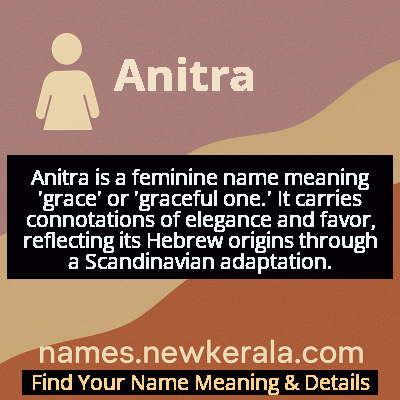Anitra Name Meaning & Details
Origin, Popularity, Numerology Analysis & Name Meaning of Anitra
Discover the origin, meaning, and cultural significance of the name ANITRA. Delve into its historical roots and explore the lasting impact it has had on communities and traditions.
Name
Anitra
Gender
Female
Origin
Hebrew
Lucky Number
9
Meaning of the Name - Anitra
Anitra is a feminine name meaning 'grace' or 'graceful one.' It carries connotations of elegance and favor, reflecting its Hebrew origins through a Scandinavian adaptation.
Anitra - Complete Numerology Analysis
Your Numerology Number
Based on Pythagorean Numerology System
Ruling Planet
Mars
Positive Nature
Generous, passionate, energetic, and humanitarian.
Negative Traits
Impulsive, impatient, moody, and can be overly emotional.
Lucky Colours
Red, maroon, scarlet.
Lucky Days
Tuesday.
Lucky Stones
Red coral, garnet.
Harmony Numbers
1, 2, 3, 6.
Best Suited Professions
Military, sports, philanthropy, leadership roles.
What People Like About You
Courage, energy, leadership, generosity.
Famous People Named Anitra
Anitra Ford
Model and Actress
Playboy Playmate of the Month and co-host of The Price is Right
Anitra Nelsen
Actress
Broadway and film actress known for roles in 'The Great Gatsby' adaptation
Anitra Carr
Athlete
New Zealand netball player who represented her country internationally
Name Variations & International Equivalents
Click on blue names to explore their detailed meanings. Gray names with will be available soon.
Cultural & Historical Significance
The cultural journey of Anitra reflects the transmission of names across languages and artistic mediums. From its Hebrew origins meaning 'grace,' the name traveled northward, being adapted in Scandinavian countries where it acquired its distinctive '-tra' ending. Ibsen's characterization in Peer Gynt further shaped its cultural perception, associating it with exotic beauty and seductive charm. This dual heritage makes Anitra a name that carries both the weight of traditional meaning and the flair of artistic creation, representing how names can evolve while maintaining connections to their original significance.
Extended Personality Analysis
Individuals named Anitra are often perceived as graceful, charismatic, and artistically inclined. They tend to possess a natural elegance in both movement and social interactions, with an ability to make others feel comfortable and valued. Anitras are typically creative souls who express themselves through various art forms, whether dance, music, or visual arts. Their grace extends beyond physical movement to include emotional intelligence and diplomatic skills in social situations. These individuals often have a strong sense of personal style and aesthetic appreciation, combined with an intuitive understanding of human nature.
Beyond their artistic and social qualities, Anitras are known for their adaptability and resilience. While they appear delicate and graceful, they often possess inner strength that allows them to navigate challenges with poise. They value meaningful connections and tend to be loyal friends and partners. Their combination of social grace and personal depth makes them compelling individuals who can inspire others while maintaining their authentic selves. The name suggests someone who moves through life's complexities with both style and substance, balancing outward charm with inward reflection.
Modern Usage & Popularity
In contemporary times, Anitra remains a relatively uncommon but distinctive choice for baby girls. The name has maintained steady but low usage in Scandinavian countries, particularly Norway, where it has traditional roots. In English-speaking countries, it's considered an exotic and elegant alternative to more common names like Anna or Anita. Recent naming trends show a slight increase in usage as parents seek unique yet meaningful names with cultural depth. The name appeals to those looking for something familiar enough to be accessible but distinctive enough to stand out. Its literary and musical associations continue to give it artistic and sophisticated connotations in modern contexts, making it particularly attractive to families with Scandinavian heritage or appreciation for classical arts and literature.
Symbolic & Spiritual Meanings
Symbolically, Anitra represents the embodiment of grace in motion and spirit. The name carries connotations of fluidity, beauty, and harmonious movement, much like dance itself. It symbolizes the intersection of tradition and romance, connecting ancient meanings of divine favor with more contemporary ideals of feminine charm and independence. Anitra also represents cultural synthesis, bridging Hebrew spiritual traditions with European romanticism. The name suggests someone who moves through life with purpose and elegance, capable of adapting to different situations while maintaining their core identity. It embodies the idea that true grace involves both external beauty and internal strength, making it a powerful symbolic representation of balanced femininity that honors both tradition and individual expression.

